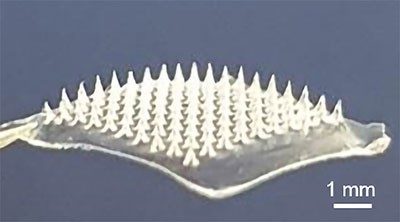FOR IMMEDIATE RELEASE
ACS News Service Weekly PressPac: September 22, 2021
Microneedle patch delivers COVID-19 DNA vaccine; doesn’t require cold storage
“Separable Microneedle Patch to Protect and Deliver DNA Nanovaccines Against COVID-19”
ACS Nano
More than 2 billion people worldwide are fully vaccinated against COVID-19. However, many who live in resource-limited countries haven’t been able to get vaccines, partly because these areas lack temperature-controlled shipping and storage facilities. Now, researchers reporting in ACS Nano have developed a microneedle patch that delivers a COVID-19 DNA vaccine into the skin, causing strong immune responses in cells and mice. Importantly, the patch can be stored for over 30 days at room temperature.
To date, the U.S. Food and Drug Administration has authorized three vaccines for use during the COVID-19 pandemic: one based on protein, and two on RNA. All of them must be kept refrigerated or frozen, which limits their distribution to remote or resource-limited areas. In addition, the vaccines must be administered by a healthcare worker as an injection into a muscle. Because immune cells aren’t typically found in muscles, scientists have investigated various ways to deliver vaccines into the skin, which contains abundant antigen-presenting cells (APCs) and could therefore generate a stronger immune response. Hui Li, Guangjun Nie, Hai Wang and colleagues wanted to develop a microneedle patch that efficiently delivers a COVID-19 vaccine under the skin, causing potent and durable immunity without the need for a cold chain or painful injections.
The researchers based their vaccine on DNA, which is easier to make than RNA or protein. It’s also more stable than RNA. However, in clinical trials, intramuscular DNA vaccines have been limited in their effectiveness because, unlike RNA or protein, the DNA must find its way inside the cell nucleus to work. By delivering the vaccine into APC-rich skin rather than muscle, the researchers reasoned that they could increase the chances that the DNA would enter the nucleus of an APC.
To make their delivery system, the team attached DNA sequences encoding either the SARS-CoV-2 spike protein or nucleocapsid protein to the surface of non-toxic nanoparticles. Inside the nanoparticles was an adjuvant — a molecule that helps stimulate an immune response. Then, the researchers coated a microneedle patch with the vaccine nanoparticles. The small rectangular patch contained 100 biodegradable microneedles, each less than 1/10 the diameter of a bee’s stinger, that could painlessly penetrate the skin’s outer layer. The researchers tested the system in mice, showing that the spike-protein-encoding microneedle patch caused strong antibody and T-cell responses, with no observable side effects. Because the vaccine patches can be stored at room temperature for at least 30 days without losing efficacy, they could be an important tool for developing COVID-19 vaccines with global accessibility, the researchers say.
The authors acknowledge funding from the National Natural Science Foundation of China and the Key Laboratory for Biomedical Effects of Nanomaterials and Nanosafety, Chinese Academy of Sciences.
###
The American Chemical Society (ACS) is a nonprofit organization chartered by the U.S. Congress. ACS’ mission is to advance the broader chemistry enterprise and its practitioners for the benefit of Earth and all its people. The Society is a global leader in promoting excellence in science education and providing access to chemistry-related information and research through its multiple research solutions, peer-reviewed journals, scientific conferences, eBooks and weekly news periodical Chemical & Engineering News. ACS journals are among the most cited, most trusted and most read within the scientific literature; however, ACS itself does not conduct chemical research. As a leader in scientific information solutions, its CAS division partners with global innovators to accelerate breakthroughs by curating, connecting and analyzing the world’s scientific knowledge. ACS’ main offices are in Washington, D.C., and Columbus, Ohio.
To automatically receive press releases from the American Chemical Society, contact newsroom@acs.org.
Note: ACS does not conduct research, but publishes and publicizes peer-reviewed scientific studies.
Media Contact
ACS Newsroom
newsroom@acs.org

View larger image

